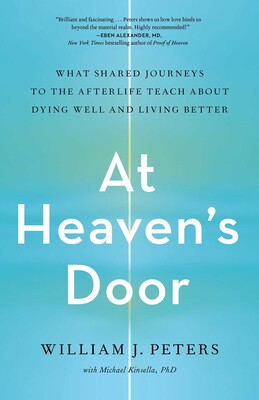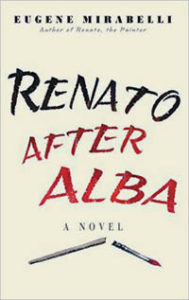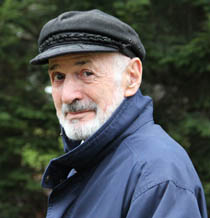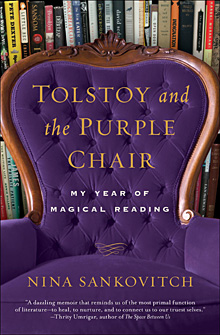William J. Peters: At Heaven’s Door-What Shared Journeys to the AfterLife Teach about Dying Well and Living Better
January 25, 2022 by David
Filed under Non-Fiction, WritersCast
 At Heaven’s Door – What Shared Journeys to the Afterlife Teach about Dying Well and Living Better – William J. Peters – with Michael Kinsella – Simon and Schuster – 978-1-9821-5042-6 – Hardcover – 248 pages – $26.00 – January 18, 2022 – ebook editions available at lower prices
At Heaven’s Door – What Shared Journeys to the Afterlife Teach about Dying Well and Living Better – William J. Peters – with Michael Kinsella – Simon and Schuster – 978-1-9821-5042-6 – Hardcover – 248 pages – $26.00 – January 18, 2022 – ebook editions available at lower prices
William Peters is a therapist who had worked for many years with people at the end of their lives. In 2000, when he was volunteering at the Zen Hospice Project in San Francisco , he experienced something very similar to what mystics describe and what some people who have been close to death have reported, the sense of floating in midair, completely out of the body. In this case, he was with his patient in this “other dimension” and the dying person looked at him and smiled. Peters himself returned to his body, but the patient remained unconscious and soon died.
This powerful experience set Peters off on what has become the journey of his life’s work. He began searching for other people who had had similar experiences. He spent more than twenty years finding people, talking to them, and meticulously categorizing their stories to identify the patterns and characteristics of what he calls the “shared crossing” experience. What is really interesting is how similar all these experiences are, regardless of age, gender, background, cultural origin, etc. Many of these stories are included in this book, as people have had visual and sensory effects that are to them evidence of another dimension, that brought with them powerful emotional after-effects that in most cases stayed with them and completely changed their understanding of reality.
Apparently this kind of experience is known to many in the hospice community and even some otherwise rationalist medical practitioners. The book is filled with stories of all kinds, some are spouses and parents of loved ones lost either suddenly or after long illnesses, and some stories are told by individuals who were simply present at someone’s final passage and were chosen to share the experience, or in some cases to help usher the dying person into the light of this “afterlife” dimension.
After years of research and documentation, Peters has a lot to say about what all of these experiences might mean for us – the living. Regardless of our outlooks and beliefs, we all want to know what will happen to us when we die, and those who have shared in the death experience as reported here might allay our all too reasonable fear and help explain what comes next. Our culture does not embrace the experience of death as many other cultures have done – our medicine tries desperately to stave off death, and we are all so attached to living, with no training or understanding of death, we push it away completely.
It does not matter whether you embrace or reject the stories told here, or the literal descriptions of the “afterlife” and the other dimensions the dying experience. Maybe what we experience at death is just a biological projection, after all. Whatever you may choose to believe, knowing more about death, understanding the end-of-life passage, and better integrating it into our lives is important for our psyches.
William Peters is the founder of the Shared Crossing Project and director of its Research Initiative. He has spent many years studying end-of-life experiences. Peters worked as a hospice volunteer with the Zen Hospice Project in San Francisco and as a teacher and social worker in Central and South America. A practicing grief and bereavement therapist, he holds degrees from Harvard’s Graduate School of Education and UC Berkeley.
I had a terrific conversation with William Peters. The book, and my conversation with the author have stayed with me and I continue to explore where it has taken me. It appears to be a simple book, but comes with many layers of understanding and thoughtfulness for the attentive reader.
Visit the Shared Crossing website here.
Podcast: Play in new window | Download
Eugene Mirabelli: Renato After Alba (a novel)
June 13, 2017 by David
Filed under Fiction, WritersCast
 Renato After Alba – Eugene Mirabelli – McPherson & Company – hardcover – 978-1-62054-026-8 – 192 pages – $24.00
Renato After Alba – Eugene Mirabelli – McPherson & Company – hardcover – 978-1-62054-026-8 – 192 pages – $24.00
Eugene Mirabelli has been writing novels since the late 1950s. His first book, The Burning Air, was published by Houghton Mifflin in 1959. Over the years, his style has changed and matured as he developed his voice as a novelist. I was introduced to Gene’s work by his current publisher, Bruce McPherson, who is the kind of publisher who hands you a book and says, “you need to read this.” Over the years, I have made many literary discoveries by following Bruce’s recommendations.
Renato After Alba is the sequel to Gene’s 2012 novel, Renato, the Painter. It is warm, painful, and and highly personal. This book is called a grief novel for a reason. Do not be afraid to pick up this short novel, and dive into this writer’s exploration of sadness and beautiful sorrow. It is moving and entertaining, and revelatory, and as the best fiction does, will make you feel deep emotion in a transformative way.
Artist Renato Stillamare’s beloved wife of fifty years dies unexpectedly, leaving him heartbroken and dazed. The novel is a pastiche of fragments, much like a collage, with the artist trying to discover where all the pieces of his life and memories belong. He recounts stories of the members of his Sicilian-American family, conversations with friends, family members, and even new people in his life. All of it is an effort to rebuild a life without Alba, or with the memory of her, in a way that will enable Renato to continue living. There is humor, and pain and discovery, all the things in life that make it worth living, and a book well worth reading.
One of the pleasures Writerscast has brought me is the opportunity to read great books and to talk to their authors about writing, art and life. Meeting Gene Mirabelli through his writing and in conversation has been a singular pleasure for me.
“For anyone who loves the work of James Salter or William Trevor, Eugene Mirabelli is another writer to treasure, and Renato After Alba is one of the best books I’ve read in ages — a beautiful, profound and exhilarating novel about what sustains us in the face of inevitable loss.” — Elizabeth Hand, author of Hard Light and Generation Loss
As Robert Gray reported in Shelf Awareness:
November 4, 2016 was proclaimed Eugene Mirabelli Day in Albany, N.Y. In her proclamation, Mayor Kathy M. Sheehan noted that in his most recent book, Renato After Alba–a sequel to his 2012 novel Renato, the Painter (both published by McPherson & Co.)–the 85-year-old author “touches upon universal aspects of human existence by creating lovably flawed characters who subtly express the full range of human emotion and experience, from great joy to crushing loss, from deep love of life to rage against the inevitability of death. All written with clarity and cleverness and craft.”
Eugene Mirabelli is the author of nine highly acclaimed novels — five of which feature members of Renato’s extended family and his friends. Visit Eugene’s website is here. Publisher McPherson & Co. website is here.
Podcast: Play in new window | Download
Nina Sankovitch: Tolstoy and the Purple Chair
June 5, 2011 by David
Filed under Non-Fiction, WritersCast
 978-0061999840 – Harper – $23.99 – Hardcover (ebook version also available)
978-0061999840 – Harper – $23.99 – Hardcover (ebook version also available)
This is truly a wonderful book by an exceptional writer. Nina Sankovitch was living a full, active life as an environmental lawyer, happily married with four children, when her beloved sister became ill with cancer and died far too young. As she recounts in Tolstoy and the Purple Chair: My Year of Magical Reading, her initial response to her sister’s death was to “live her life double,” doing everything she could to try to make up for her terrible and painful loss. After three frantic years she realized what she was doing was unsustainable.
Ironically, her apparent retreat from doing to experiencing through reading was in some ways no less radical. Nina committed to reading a book a day for an entire year, no small commitment in itself, but further, she committed herself to writing a review or think piece about every book she read. That is a very high bar to set for any modern parent, even with a patient and understanding family (when I started Writerscast, I committed myself to read at least one book each week and to interview its author, a far lesser commitment, and after two years of doing it, I know how difficult, even impossible it would be for me to read a book a day, for a short period of time, much less a full year).
But Nina turned to reading because reading has always been central to her life and experience. Her immigrant parents read and loved books, as did Nina, from an early age. In Tolstoy and the Purple Chair, Nina tells the story of both her families, the vibrant one she grew up in, and the supportive and happy one she has raised. Many of the books she read in her magical year of reading are discussed here, as the stories of these books are part of the weave of how she transformed her experience of death into a celebration of life. And that is the crux of this memoir. By leaving her own experience to enter the realms of literally hundreds of writers, and making a place for those other stories in her own life, Nina was able to recreate and restore her own psyche – that’s the magic, the alchemy, of her magical year.
I should mention that Nina lives near me and has become a valued friend, partly through books we’ve read and discussed, including a couple I gave her to read and which are included in her year of reading. During that year she started an excellent blog called Read All Day where you can find all of her well written and exceptionally perceptive book reviews and essays.
Podcast: Play in new window | Download

